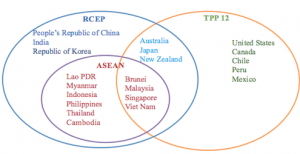Newspaper Article 29/02/2016
Trans-pacific Partnership (TPP) is a Free Trade Agreement (FTA) among 12 countries, namely the US, Japan, Malaysia, Vietnam, Singapore, Brunei, Australia, New Zealand, Canada, Mexico, Chile and Peru. The presence of giant economies like the US and Japan in TPP raise the trade grouping’s stature. The TPP would constitute 40 percent of Gross Domestic Product (GDP). The economic body has adopted the ‘Second Generation’ trade rules and regulations (much more advanced and sophisticated than the WTO negotiations). The agreement would link trade, economic and investment with labour laws and environmental protection issues, in addition, to other regulatory and technical issues.
Multilateralism and regionalism leads to further integration, and trade liberalization. A successful TPP would generate over US $110 billion per year. Likewise, the RCEP would generate income of US $ 300 billion annually. In view of the benefits associated with trade liberalization, Asia could gain a lot by concluding a broader Free Trade Agreement (FTA) of the Asia-Pacific (FTAAP). However, the politico-strategic objectives behind the trade groupings, in addition, to the economic significance could prove to be detrimental for the regional harmony. The competing powers try to create a preferred regional framework, with the ultimate goal of enhancing influence. As stated by President Obama and State Secretary Hillary Clinton during the Asia Pacific Economic Cooperation (APEC) meeting in Honolulu in 2011: “the TPP serves as the economic arm of the US geopolitical strategy to maintain its political and economic influence in Asia Pacific by creating region wide legal regime that serves the interests of and is enforceable by the US and its corporations”. China’s absence from the TPP and the US not being a part of RCEP, raises the speculation of the US-China competition.
The TPP and the RCEP are structured differently. The trading rules of TPP and RCEP are in sharp contrast (and the economic bodies merger is not likely). The US-China factor is apparent in these trade groupings. The US would have an access to the fastest growing region’s of the world, and through the economic muscle, the US could exercise its geopolitical influence. Likewise, the RCEP aims to harmonize China’s trade ties with the regional states. Thus, the US and China are set to enhance economic links with the regional states, but within their own respective regional economic framework. This exclusionist strategy adopted by the US and China to reinforce their influence would impact the East Asian economic architecture. The maritime disputes in South China Sea and the East China Sea could become the pushing factor behind ASEAN states entry into TPP.
Amna Ejaz Rafi
Researcher, Islamabad Policy Research Institute (IPRI)
Disclaimer: Views expressed are of the writer and are not necessary reflective of IPRI policy.


